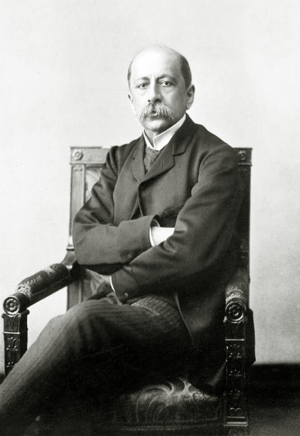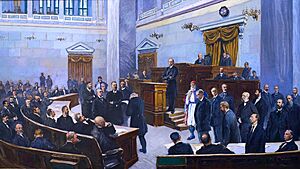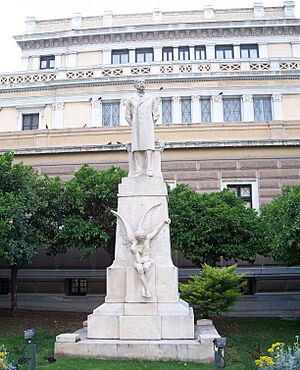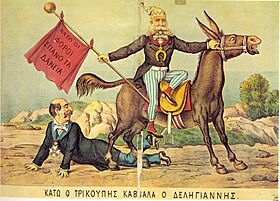Charilaos Trikoupis facts for kids
Quick facts for kids
Charilaos Trikoupis
|
|
|---|---|
| Χαρίλαος Τρικούπης | |

Charilaos Trikoupis (1880 photograph)
|
|
| Prime Minister of Greece | |
| In office 27 April 1875 – 15 October 1875 o.s.) |
|
| Monarch | George I |
| Preceded by | Dimitrios Voulgaris |
| Succeeded by | Alexandros Koumoundouros |
| In office 21 October – 26 October 1878 (o.s) |
|
| Preceded by | Alexandros Koumoundouros |
| Succeeded by | Alexandros Koumoundouros |
| In office 10 March – 13 October 1880 (o.s) |
|
| Preceded by | Alexandros Koumoundouros |
| Succeeded by | Alexandros Koumoundouros |
| In office 3 March 1882 – 19 April 1885 (o.s) |
|
| Preceded by | Alexandros Koumoundouros |
| Succeeded by | Theodoros Deligiannis |
| In office 9 May 1886 – 24 October 1890 (o.s) |
|
| Preceded by | Dimitrios Valvis |
| Succeeded by | Theodoros Deligiannis |
| In office 10 June 1892 – 3 May 1893 (o.s) |
|
| Preceded by | Konstantinos Konstantopoulos |
| Succeeded by | Sotirios Sotiropoulos |
| In office 30 October 1893 – 12 January 1895 (o.s) |
|
| Preceded by | Sotirios Sotiropoulos |
| Succeeded by | Nikolaos Deligiannis |
| Personal details | |
| Born | 11 June 1832 Nafplion, Greece |
| Died | 30 March 1896 (aged 63) Cannes, France |
| Resting place | Athens, Greece |
| Political party | Modernist Party |
| Parent |
|
| Relatives | Alexandros Mavrokordatos (uncle) |
Charilaos Trikoupis (Greek: Χαρίλαος Τρικούπης; 11 July 1832 – 30 March 1896) was a very important Greek politician. He served as the Prime Minister of Greece seven times between 1875 and 1895.
He is famous for changing the Greek constitution to include the "vote of confidence." He also started big projects like building the Corinth Canal. Even though he led Greece to bankruptcy later, many people see him as the founder of modern Greece.
Contents
Early Life and Career
Charilaos Trikoupis was born in Nauplion, Greece, in 1832. His father, Spiridon Trikoupis, was also a politician and briefly served as Prime Minister in 1833. His mother, Ekaterini, was the sister of Alexandros Mavrokordatos, another former Prime Minister.
Charilaos studied law and literature in Athens and Paris. After finishing his studies, he worked for the Greek government in London starting in 1852. By 1863, he was a senior diplomat. However, he wanted to be a politician, not just a diplomat.
In 1865, he helped Greece get the Ionian Islands from the United Kingdom. After this, he returned to Athens and was elected to the Hellenic Parliament. The next year, at only 34 years old, he became the Minister for Foreign Affairs.
"Who's to Blame?" and Political Change
In 1872, Trikoupis started his own political party, called the Fifth Party. He wanted to make big changes to how the government worked.
On June 29, 1874, he wrote an important article in a newspaper called Kairoi. The article was titled "Who's to blame?" (Greek: Τις Πταίει;). In it, he openly criticized King George I. Trikoupis said the King was causing political problems by choosing prime ministers who didn't have enough support from the people.
He argued that the King's power to pick and remove governments led to weak governments. These governments relied only on the King's favor, not on the will of the people. Trikoupis believed this made the country unstable.
To fix this, Trikoupis suggested a new rule: the "principle of declared confidence." This meant that the King should only appoint a Prime Minister who had the clear support of the majority in Parliament. He believed this would lead to a stronger, more stable government system with fewer parties.
His article caused a stir and he was even put in jail for a short time. But it also made him very popular. A year later, in May 1875, he gained enough support in Parliament. King George I then had to name him Prime Minister. Trikoupis became the leader of a new party, called the New (or Modernist) Party.
Leading Greece: Reforms and Challenges

One of Trikoupis's first actions as Prime Minister was to change election laws. He also made the "Dedilomeni principle" (Αρχή της Δεδηλωμένης) official. This rule meant the King had to appoint the leader of the party with the most votes in Parliament as Prime Minister. This helped Greece become a modern parliamentary country.
For the next six years, Greece had many different prime ministers because political alliances kept changing. Trikoupis led three of these short-lived governments. He didn't have much time to start his big plans for reform. His main goal was to make Greece stronger by improving its economy and building up its army and navy. He wanted Greece to become a leading country in Southeastern Europe.
It wasn't until 1882 that he could truly begin his work. He became Prime Minister for the third time (his second term had been very short). He immediately focused on making Greece's finances stronger and helping the country become richer. He did this by building new roads, railways, and harbors. Even though Greece was a poor country at the time, Trikoupis had a vision for a modern nation with good infrastructure.
His government from 1882 was more stable and lasted over three years. During this time, he pushed through many reforms. Trikoupis strongly believed that Greece needed good infrastructure to support its economy and attract money from other countries. He started a big program to build roads and railways, which made travel and trade much easier within Greece.
One of his most famous projects was the digging of the Corinth Canal. This canal connected two seas, making shipping much faster. He also dreamed of building a bridge to connect the cities of Rio and Antirrio across the Gulf of Corinth. This bridge was too difficult and expensive to build back then. But it was finally completed in 2004 and named the Charilaos Trikoupis Bridge in his honor.
Trikoupis faced challenges, especially with money. Greece had spent a lot on its military. Other powerful countries even blocked the port of Piraeus to stop Greece from going to war. Trikoupis tried to improve Greece's money situation, but it was very difficult. He lost the election in 1885 but became Prime Minister again the next year, continuing his economic reforms.
The Olympic Games and Bankruptcy
Even though a man named Evangelis Zappas had given a lot of money in 1856 for Athens to host athletic Olympic Games, Trikoupis and other government members were against it. Trikoupis preferred to have industrial and agricultural competitions instead of sports. The Zappeion, a building meant to honor Zappas, was intended by Trikoupis for these industrial events. Despite his views, the Zappeion became the first indoor Olympic arena for fencing in 1896 and even the first Olympic Village in 1906. Interestingly, Trikoupis passed away during the first week of the Athens 1896 Olympics.
His sixth time as Prime Minister (from June 1892 to May 1893) was very dramatic. Greece's money had run out because of too much spending and corruption. Trikoupis stood before Parliament and made a very famous statement: "Unfortunately, we are bankrupt" (Greek: "Δυστυχώς επτωχεύσαμεν"). This meant Greece could not pay back its foreign loans. He had to cut all spending that wasn't absolutely necessary.
Trikoupis was Prime Minister again from November 1893 to January 1895. During this time, planning for the 1896 Summer Olympics began. Trikoupis was worried about hosting the Games because he feared Greece couldn't afford them. However, he was eventually convinced and made the necessary arrangements. This was his last time in office.
Later Life and Legacy
Trikoupis tried to make agreements with the countries Greece owed money to, but he couldn't. The new taxes he suggested to deal with the bankruptcy made many people angry. In January 1895, he resigned. Four months later, his party lost the general election badly, and Trikoupis didn't even win a seat in Parliament. This led him to leave politics and move to Cannes, France.
He was elected to Parliament again in March 1896, but he never returned to Greece to take his seat. Charilaos Trikoupis died in Cannes on March 30, 1896, and was buried in Athens.

Charilaos Trikoupis is remembered as one of Greece's greatest modern politicians. He introduced important reforms and worked hard to modernize the country. His "dedilomeni principle" changed Greek politics forever. Many roads in Greek cities, as well as the impressive Rio–Antirrio Bridge, are named after him to honor his contributions.
 | Kyle Baker |
 | Joseph Yoakum |
 | Laura Wheeler Waring |
 | Henry Ossawa Tanner |


